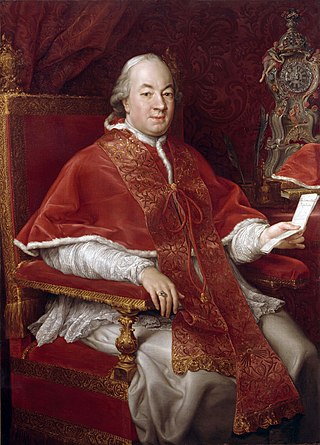
Pope Pius VI was head of the Catholic Church and ruler of the Papal States from 15 February 1775 to his death in August 1799.
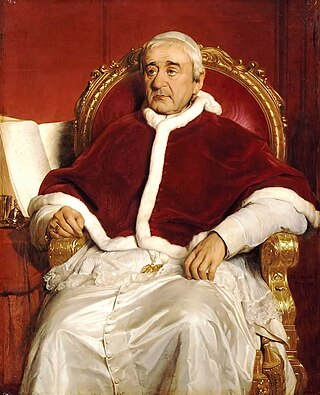
Pope Gregory XVI was head of the Catholic Church and ruler of the Papal States from 2 February 1831 to his death in June 1846. He had adopted the name Mauro upon entering the religious order of the Camaldolese.

Pope Pius VII was head of the Catholic Church from 14 March 1800 to his death in August 1823. He ruled the Papal States from June 1800 to 17 May 1809 and again from 1814 to his death. Chiaramonti was also a monk of the Order of Saint Benedict in addition to being a well-known theologian and bishop.

Pope Pius VIII was head of the Catholic Church and ruler of the Papal States from 31 March 1829 to his death in November 1830.

The Catechism of the Catholic Church is a reference work that summarizes the Catholic Church's doctrine. It was promulgated by Pope John Paul II in 1992 as a reference for the development of local catechisms, directed primarily to those responsible for catechesis and offered as "useful reading for all other Christian faithful". It has been translated into and published in more than twenty languages worldwide.
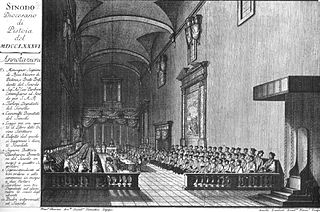
The Synod of Pistoia was a 1786 diocesan synod in the Catholic diocese of Pistoia, then part of the territory of the Grand Duchy of Tuscany. It was convoked by its bishop Scipione de' Ricci under the patronage and active support of the Habsburg-Lorraine Grand Duke Leopold. The synod adopted a series of decrees of Febronian or Gallican tendency, against the background of Enlightenment thinking. Leopold hoped the synod's resolutions would be taken up by a "national" council and increase state autocratic control over the Church in Tuscany. However, in 1787 the ensuing synod of bishops rejected the Pistoia decrees, and in 1794 Pope Pius VI condemned 85 of them, leading Ricci to recant.
Qui pluribus is an encyclical promulgated by Pope Pius IX on 9 November 1846. It was the first encyclical of his reign and written to urge the prelates to be on guard against the dangers posed by rationalism, pantheism, socialism, communism and other popular philosophies. It was a commentary on the widespread civil unrest spreading across Italy, as nationalists with a variety of beliefs and methods sought the unification of Italy.
There are many papal pronouncements against Freemasonry; the most prominent include:
In supremo apostolatus is a papal brief issued by Pope Gregory XVI regarding the institution of slavery. Issued on December 3, 1839, as a result of a broad consultation among the College of Cardinals, the bull resoundingly denounces both the slave trade and the continuance of the institution of slavery.

Hyacinthe Sigismond Gerdil, CRSP was an Italian theologian, bishop and cardinal, who was a significant figure in the response of the papacy to the assault on the Catholic Church by the upheavals caused by the French Revolution.

The Diocese of Pistoia is a Latin diocese of the Catholic Church located in the Province of Florence. It has existed since the third century. From 1653 to 1954, the historic diocese was the diocese of Pistoia and Prato. The Diocese of Prato has been separate from 1954. The diocese is a suffragan of the archdiocese of Florence.

Scipione de' Ricci was an Italian Catholic prelate, who was bishop of Pistoia from 1780 to 1791. He was sympathetic to Jansenist ideas in theology.

The Diocese of Pescia is a Latin diocese of the Catholic Church in Tuscany, about 41 miles (66 km) west of Florence. It is a suffragan of the Archdiocese of Pisa.
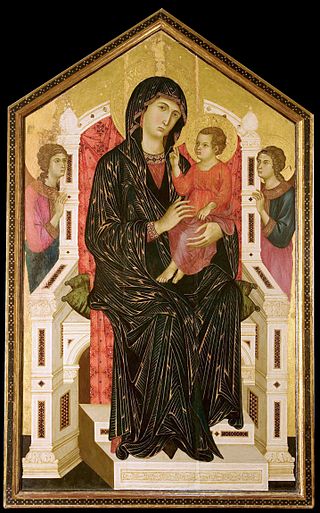
Mariological papal documents have been a major force that has shaped Roman Catholic Mariology over the centuries. Mariology is developed by theologians on the basis not only of Scripture and Tradition but also of the sensus fidei of the faithful as a whole, "from the bishops to the last of the faithful", and papal documents have recorded those developments, defining Marian dogmas, spreading doctrines and encouraging devotions within the Catholic Church.
Quo graviora could refer to one of two papal documents:
Quo graviora, or On the Pragmatic Constitution, was the name of a papal brief issued by Pope Gregory XVI on 4 October 1833. It was addressed to the bishops of the Upper Rhineland concerning the movement for reforms in the ecclesiastical province of the Rhineland at that time.
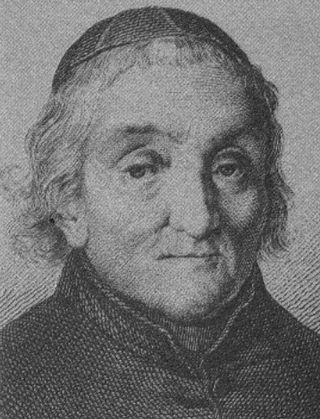
Pietro Tamburini was an Italian theologian and jurist. He openly espoused Jansenism as a university professor.
The Synod of Qarqafe was a council of the Melkite Greek Catholic Church held in 1806. The synod adapted and ratified propositions of the 1786 Synod of Pistoia. It would be formally condemned in 1835 by Pope Gregory XVI in the bull Melchitarum Catholicorum Synodus.
Inter praecipuas machinationes, or On Biblical Societies, was an encyclical issued by Pope Gregory XVI on 8 May 1844, condemning Protestant translations of the Bible.
Dilexit nos is the fourth encyclical of Pope Francis, subtitled "On the human and divine love of the Heart of Jesus Christ". Similar to previous encyclicals, in Dilexit nos Pope Francis criticises modern phenomena, such as individualism, social and economic disparities, and "uses of technology that threaten our humanity", and calls for rediscovery of "heart" as a way towards unity, peace, and reconciliation in the modern era.












